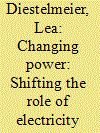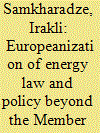| Srl | Item |
| 1 |
ID:
166433


|
|
|
|
|
| Summary/Abstract |
One of the pressing legal questions of the energy transition is how to integrate “prosumers”, consumers who start producing electricity, in the electricity market. So far, their influence remains limited or fully absent because their role as independent market participants is barely or not facilitated as they are usually subject to regulated remuneration schemes. Blockchain technology offers changing the approach of “integration in the market” into “becoming the market” by enabling peer-to-peer transactions. Currently, transactions are facilitated by third parties, suppliers and system operators, whose main task is centrally compiling and coordinating information on loads and generation and contracting supply and distribution services. Instead, blockchain technology enables new ways of organising decentralised persons without the immediate need for one centrally connecting entity. This implies profound legal- and policy consequences. Based on information on first use cases of blockchain applications in the electricity sector, this article identifies those main policy implications for EU electricity law and thereby adds to the discussion how blockchain technology could facilitate “prosumers” to develop as independent market participants in the electricity sector from an energy law perspective.
|
|
|
|
|
|
|
|
|
|
|
|
|
|
|
|
| 2 |
ID:
168336


|
|
|
|
|
| Summary/Abstract |
The external dimension of EU energy law is gaining momentum in legal scholarship. The European Union has reached a certain degree of influence in exporting its internal energy rules and values beyond the Member States. Nevertheless, the theory of legal harmonisation between the EU and ‘third countries’ remains underdeveloped. This paper aims to address this deficit by analysing the effects of legal harmonisation in energy outside the current domain of the EU. The paper draws on the example of Georgia, as a Contracting Party to the Energy Community Treaty, and assesses the potential impact of EU energy legislation on Georgia's municipal law triggered by the Community membership. It further uncovers a number of uncertainties that are likely to arise before Georgia in the course of implementing the energy acquis and advocates for the process to be guided through a set of common energy law principles. These aspects are discussed to explain the nature of expanding EU energy law and policy in ‘third countries’ and to contribute to the ongoing debate about energy law, as an emerging academic discipline.
|
|
|
|
|
|
|
|
|
|
|
|
|
|
|
|